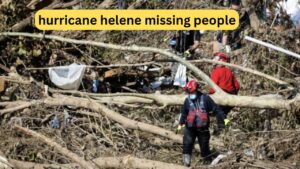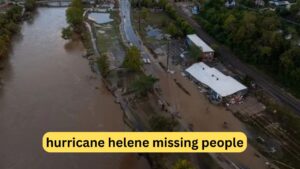Hurricane Helene Missing People: The Search for the 92 Missing in North Carolina
Hurricane Helene left behind a trail of destruction when it hit North Carolina, but perhaps the most heartbreaking aftermath is the number of missing people. According to reports, 92 people are still missing after the storm wreaked havoc on the state. As search and rescue efforts continue, authorities are urging the public to stay vigilant and report any signs of the missing individuals.
The Devastation of Hurricane Helene
Hurricane Helene was a Category 4 hurricane that struck the East Coast with unprecedented force. North Carolina, in particular, bore the brunt of the storm’s fury, experiencing widespread flooding, property damage, and sadly, numerous fatalities and missing persons. Many communities were unprepared for the magnitude of the storm, leaving countless residents displaced and separated from loved ones.
The days following the hurricane have been critical, as authorities work around the clock to locate the 92 missing people. Family members, friends, and concerned citizens are all praying for good news, but with each passing day, the urgency of the situation grows.

Search and Rescue Operations
In the wake of Hurricane Helene, the government of North Carolina has mobilized search and rescue teams to scour the areas most affected by the storm. These teams are using helicopters, drones, and on-the-ground search efforts to locate any signs of life. However, the search is complicated by the vast amount of debris left in the wake of the hurricane, as well as ongoing flooding that has made certain areas inaccessible.
Governor Roy Cooper stated, “We will not rest until we find every last person. The safety and well-being of our citizens is our top priority.” Local law enforcement, the National Guard, and FEMA are all working together to accelerate the search and bring closure to the families of those still missing.
The missing people are scattered across different regions, with some last seen in flood-prone areas that are still partially underwater. Rescue operations are being hindered by poor weather conditions, further complicating the recovery efforts. However, authorities remain hopeful that some of the missing may have sought refuge with neighbors or in nearby shelters.
Causes of Missing Persons During the Hurricane
Natural disasters like Hurricane Helene often lead to a surge in the number of missing persons for several reasons:
- Communication Breakdown: During a hurricane, cell towers and communication infrastructure often fail, making it difficult for people to stay in touch with loved ones. Many families have reported losing contact with relatives during the height of the storm, leading to confusion and worry.
- Flooding and Swift Water Currents: The heavy rainfall associated with Hurricane Helene caused flash floods and swift water currents, which can sweep people away in minutes. Unfortunately, many missing persons may have been caught in these currents, making it harder for rescue teams to locate them.
- Evacuation Miscommunication: While evacuation orders were issued in some areas, there were instances where residents did not receive timely notifications or chose to stay behind. Some of the missing may have been trapped in their homes when the floodwaters rose, preventing them from escaping to safety.
- Displacement: In the chaos of evacuation, it’s easy for people to become separated from their families, especially the elderly or those with disabilities. Some of the missing individuals may be alive but displaced, unable to contact their loved ones due to destroyed infrastructure or power outages.
The Role of Volunteers and Relief Agencies
In addition to government efforts, numerous volunteer organizations have stepped in to aid in the search for the missing. Local charities, as well as national organizations such as the American Red Cross and Team Rubicon, are providing essential resources, including food, shelter, and medical aid to those affected by the hurricane. These groups are also assisting in the search efforts by organizing volunteer search teams, distributing missing person posters, and offering support to families who are anxiously waiting for news.
Volunteers have been instrumental in the relief efforts, navigating through difficult terrain to check on the wellbeing of residents, particularly in remote areas that are cut off from main rescue operations. Their determination to help their fellow citizens has been vital in ensuring that no stone is left unturned in the quest to locate the 92 missing people.

What Can You Do to Help?
As the search for the missing people continues, authorities are asking the public to remain vigilant. If you have any information about the whereabouts of the missing or have witnessed unusual activity during the hurricane, it is crucial to report it immediately to the relevant authorities. Every tip, no matter how small, could be the key to reuniting a family with their missing loved ones.
Additionally, those in less-affected regions are encouraged to donate to relief organizations that are working tirelessly in North Carolina. Donations of water, non-perishable food, medical supplies, and blankets can go a long way in aiding the survivors of Hurricane Helene and supporting the ongoing search and rescue missions.
Future Preparedness for Natural Disasters
Hurricane Helene has underscored the importance of disaster preparedness. As climate change continues to exacerbate the intensity and frequency of hurricanes, communities must be better equipped to handle such crises. Local governments, residents, and businesses should work together to improve evacuation protocols, ensure timely communication during emergencies, and invest in flood protection measures.
The number of missing people following the hurricane serves as a reminder of the unpredictable and often devastating nature of natural disasters. While the search efforts will hopefully bring some closure, there is much to be done in terms of safeguarding communities from future hurricanes and mitigating the risks of loss of life and displacement.

Conclusion: The Urgent Need for Action
As North Carolina continues to grapple with the aftermath of Hurricane Helene, the fate of the 92 missing people remains uncertain. With every passing hour, the search for survivors becomes more critical, and the dedication of the rescue teams cannot be overstated. Families of the missing continue to hold out hope, clinging to the possibility that their loved ones will be found alive.
The impact of Hurricane Helene is a tragic reminder of the power of nature and the importance of preparation, response, and recovery. For now, the focus remains on finding those who are still missing and providing support to the communities devastated by the storm.
Psychological Impact on Families and Communities
The aftermath of Hurricane Helene has had a significant emotional and psychological toll on the families of the missing people. While many anxiously await updates, the uncertainty and the prolonged search can be mentally exhausting. Families often experience a mix of hope, fear, and grief as they grapple with the unknown. This emotional turmoil has prompted local mental health organizations to step in, offering counseling and emotional support to those affected.
Support groups and hotlines have been set up to assist families in navigating these difficult times. These organizations are providing grief counseling, stress management, and even legal advice in cases where next-of-kin need assistance in managing missing persons reports. The community, coming together in solidarity, has also played a crucial role, with neighbors offering emotional and physical support to those most in need.
The broader community, too, is dealing with a sense of collective trauma. Churches, local organizations, and social support networks have set up relief hubs where people can share information, provide mutual aid, and gather in remembrance of those who are still missing or have lost their lives.

Environmental Consequences of Hurricane Helene
Beyond the immediate human impact, Hurricane Helene also left a profound environmental footprint. The heavy rainfall and widespread flooding have disrupted the ecosystem in coastal North Carolina. Floodwaters, which often carry pollutants, have inundated agricultural lands, spilling chemicals and waste into the water systems, threatening both local wildlife and human health.
Rivers have overflowed, submerging farmlands and sweeping away crops that many communities rely on for their livelihoods. The environmental damage will likely have a long-term effect, making recovery a prolonged process not just for homes and infrastructure but also for the local environment.
Efforts are underway by environmental agencies to assess the full scale of the damage. Clean-up efforts will include removing debris from critical water bodies and restoring wetlands that act as natural flood barriers. This process will be key to ensuring that ecosystems return to their original state and to mitigate the risk of further natural disasters exacerbating the situation.
Hurricane Preparedness: Lessons from Helene
The tragedy of Hurricane Helene serves as a stark reminder of the importance of preparedness for natural disasters. Communities must be more proactive in preparing for future hurricanes, and this begins with improving infrastructure and creating comprehensive evacuation plans.
One of the key lessons from this event is the need for early warning systems and better communication networks. The breakdown in communication during Hurricane Helene meant that some residents were caught off guard, with limited time to evacuate or secure their homes. In areas that are most vulnerable to hurricanes, there is an urgent need for modernized alert systems that can reach everyone, even during power outages.
Additionally, governments must invest more in disaster-resistant infrastructure, particularly in flood-prone areas. Dams, levees, and flood barriers need to be built or reinforced to withstand the growing intensity of storms brought on by climate change.
For individuals, preparedness means having a disaster kit ready, staying informed about evacuation routes, and ensuring that every family member knows the plan in case of an emergency. Small steps, like these, can make a big difference in reducing casualties and missing persons in future disasters.

Looking to the Future
As the search continues for the 92 missing people from Hurricane Helene, communities are slowly beginning the long process of rebuilding. The priority remains on finding survivors, but the road to recovery will be long and complex. The immediate focus is on providing relief to those displaced by the storm, but long-term efforts will need to address rebuilding homes, restoring livelihoods, and ensuring that communities are better prepared for future disasters.
Hurricane Helene is just one of many devastating storms that have hit the East Coast in recent years, and it won’t be the last. It’s clear that the time to take action on climate resilience is now. Governments, local authorities, and residents must come together to prepare for the next storm before it strikes.
As we hold onto hope for the missing, we also need to turn this tragedy into an opportunity to build stronger, more resilient communities. The lessons learned from this disaster can help save lives in the future, ensuring that when the next hurricane hits, we are better prepared.
